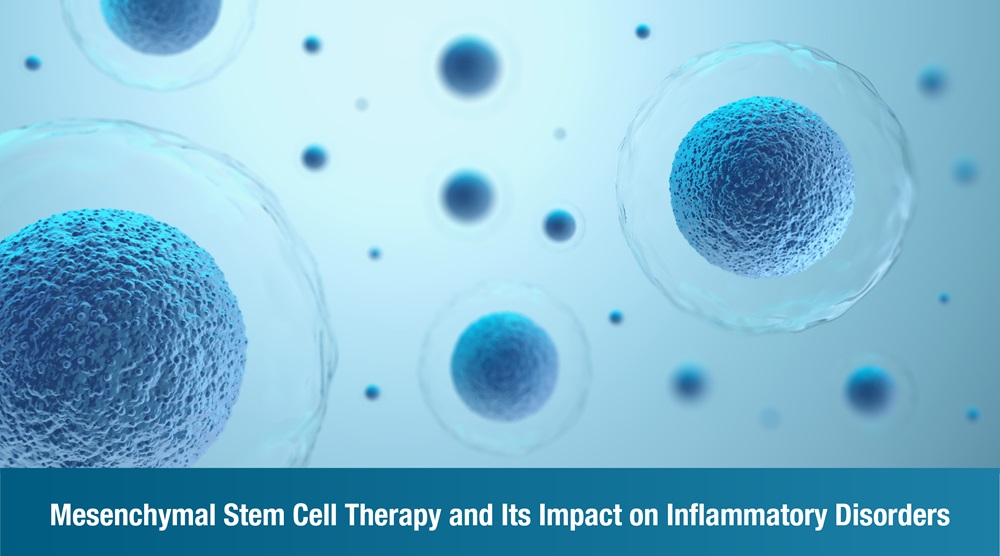
Inflammatory disorders can often feel like an endless battle. From rheumatoid arthritis to inflammatory bowel disease (IBD), these conditions not only disrupt daily life but can also bring about significant pain and discomfort.
Mesenchymal Cells (MSCs) have the remarkable ability to develop into different cell types, including those needed to repair damaged tissues. MSCs’ natural regenerative and immunomodulatory properties make them a viable option for managing conditions characterized by chronic inflammation.
This blog highlights how MSC therapy is steadfastly becoming the way ahead for treating inflammatory disorders.
How MSCs Modulate the Immune Response
The unique immunomodulatory properties of MSCs help regulate and dampen excessive immune responses that are often the root cause of inflammatory disorders. For instance, in diseases like rheumatoid arthritis or inflammatory bowel disease, the immune system mistakenly attacks the body’s own tissues, leading to chronic inflammation.
MSCs help by releasing a range of bioactive molecules that can inhibit inflammatory pathways and promote healing. They essentially act as a balancing force, restoring harmony within the immune system. This process is akin to calming a stormy sea, allowing the body’s natural healing mechanisms to take over and repair damaged tissues.
Types of Inflammatory Disorders Treated with MSCs
MSCs are being explored as a treatment for various inflammatory disorders. Some notable examples include:
- Rheumatoid Arthritis (RA) is an autoimmune disease characterized by inflammation in the joints. It causes pain and deformity. Research suggests that MSC therapy can reduce inflammation and improve joint function in RA patients.
- Inflammatory Bowel Disease (IBD) includes Crohn’s disease and ulcerative colitis, where the digestive tract becomes chronically inflamed. MSC therapy has helped reduce inflammation and promote mucosal healing in IBD patients.
- Systemic Lupus Erythematosus (SLE) is an autoimmune condition where MSCs are being studied for their potential to modulate the overactive immune response and mitigate disease symptoms.
You can read more about autoimmune conditions here.
Applications of MSC Therapy
MSC therapy has a broad range of applications in the field of regenerative medicine. Here’s how it’s being applied in practice:
- Bone Marrow MSCs: These are the most common types used in MSC therapy. They are harvested from the patient’s own bone marrow, reducing the risk of rejection. These cells can be expanded in the lab and then reintroduced into the body to target areas of inflammation.
- Adipose-Derived MSCs: Obtained from fat tissue, these MSCs have similar regenerative properties and are sometimes preferred for their easier harvest compared to bone marrow MSCs.
- Cord Blood MSCs: Derived from the umbilical cord blood of newborns, these MSCs are also being investigated for their potential in treating inflammatory disorders.
Benefits of MSC Therapy for Inflammatory Disorders
The benefits of MSC therapy extend beyond just reducing inflammation. Here are a few key advantages:
- Personalized Treatment: Since MSCs can be derived from the patient’s own body, there’s a lower risk of immune rejection, making the treatment more personalized and potentially more effective.
- Reduced Pain and Improved Function: Patients with inflammatory disorders often experience significant pain and functional impairment. MSC therapy has shown the potential to alleviate pain and improve mobility and overall function.
- Long-Term Relief: Unlike some treatments that only address symptoms temporarily, MSC therapy aims to address the underlying inflammation, potentially leading to long-lasting relief.
MSC Therapy Advancements
Recent research has focused on improving the efficiency of cell harvesting and expansion, enhancing the delivery methods, and combining MSC therapy with other treatments to boost effectiveness. Innovations like genetically modified MSCs and new biomaterials are also being explored to further enhance therapeutic outcomes.
MSC Therapy vs Other Regenerative Treatments
When comparing MSC therapy with other regenerative treatments, such as platelet-rich plasma (PRP) therapy or traditional anti-inflammatory medications, MSC therapy stands out for its multifaceted approach. While PRP therapy can be effective for certain conditions, MSC therapy offers a more comprehensive treatment by not only reducing inflammation but also promoting tissue repair and regeneration.
Traditional anti-inflammatory medications, though effective for symptom management, often come with long-term side effects. MSC therapy, with its potential to modulate the immune response and promote natural healing, may offer a more sustainable alternative.
MSC Therapy in India
In India, where chronic inflammatory conditions are widespread, MSC therapy is gaining significant traction. Plexus’ centers in Bangalore and Hyderabad are at the forefront of this transformative treatment. Our patients with severe rheumatoid arthritis and inflammatory bowel disease in particular have reported remarkable improvements in joint pain and mobility, as well as notable reductions in symptoms and enhancements in their overall quality of life (respectively).
Mesenchymal Cell therapy represents a promising frontier in the treatment of inflammatory disorders. By harnessing the regenerative and immunomodulatory properties of MSCs, we have the potential to offer more effective and personalized treatment options.
If you wish to know more about MSC therapy for inflammatory disorders, please reach out to Team Plexus today.
WhatsApp +91 89048 42087
Call +91 78159 64668 (Hyderabad) | +91 82299 99888 (Bangalore)
FAQs
Do mesenchymal Cells reduce inflammation?
Yes, mesenchymal Cells (MSCs) can reduce inflammation. They achieve this by secreting anti-inflammatory cytokines and modulating the immune response, which helps to decrease chronic inflammation and promote tissue repair.
What is the treatment for inflammatory cells?
Treatments for inflammatory cells typically involve medications such as corticosteroids, nonsteroidal anti-inflammatory drugs (NSAIDs), and immunosuppressants. In some cases, targeted therapies and biological agents are used to address the underlying causes of inflammation and manage symptoms.
What diseases are mesenchymal Cells used for?
Mesenchymal Cells are used for a range of diseases, including rheumatoid arthritis, inflammatory bowel disease, systemic lupus erythematosus, and various degenerative inflammatory disorders. Their regenerative and immunomodulatory properties make them suitable for treating these conditions.
What is the long term treatment for inflammation?
Long-term treatment for inflammation often involves a combination of lifestyle changes, such as diet and exercise, and medications like NSAIDs or disease-modifying anti-inflammatory drugs (DMARDs). Chronic management may also include biologics or immunosuppressants depending on the specific condition.










